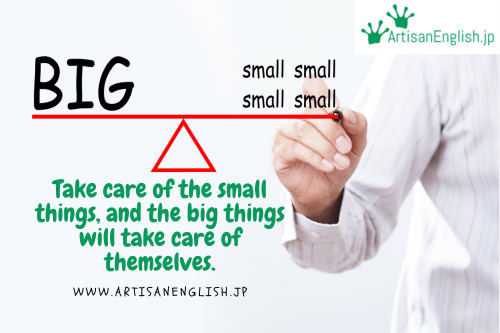
YouTube / iTunes / Spotify / Radio Public / Pocket Casts / Google Podcasts / Breaker / Overcast
Listen to ArtisanEnglish.jp posts & lesson intros here.
Proverb: Take care of the small things, and the big things will take care of themselves
Take care of the small things, and the big things will take care of themselves.
You may have heard this phrase before, and it holds true in many aspects of life.
But what does it mean, and how can we apply it to our daily lives?
Well, let’s start with the small things.
Taking care of the small things means paying attention to the details.
It means ensuring that the little things are in order so the big things can fall into place.
For example, if you’re planning for retirement (and you should be), creating a savings plan is essential.
That means putting away a small amount of money every week, sticking to a budget, and concentrating on not living beyond your means.
If you take care of these small things, the big things (like retiring with a few million in your account) will take care of themselves.
But what about less serious things?
Well, let’s look at some silly examples of taking care of the small things.
If you’re having a bad hair day, try not to let it get to you.
Take care of the small things by wearing a floppy hat or a hairband.
You’ll feel better in no time, and the big things (like your self-confidence) will take care of themselves.
Or, if you’re feeling down, take care of the small things by watching a funny movie or listening to some comedy on Instagram Reels.
Laughter is the best medicine, and if you take care of the small things, the big things (like your mood) will take care of themselves.
So, there you have it – a word to the wise: take care of the small things, and the big things will take care of themselves.
It’s a simple phrase that holds true in many aspects of life.
Flesch-Kincaid Readability Test
This post is understandable by someone with at least a 6th-grade education (age 11).
On the Flesch-Kincaid reading-ease test, this post scores 83.
The easier a passage is to read, the higher the score on a scale of 0 – 100.

